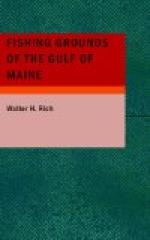Machias Seal Island. Nineteen miles E. by S. from Moosabec Light. This furnishes good ground in the water all about it, where depths are from 15 to 54 fathoms over a generally rocky and uneven bottom. In summer cod, haddock, and pollock are abundant here, the cod and haddock remaining all winter. The fishery is carried on mostly by the smaller vessels from Maine ports, principally those from Cutler, with an occasional visit by larger craft, usually from the Portland fleet. This ground is not much visited in winter. Fishing is done by trawling and hand-lining.
Gannet Rock. This lies east of the Murre Ledges. All about it is good ground in from 40 to 70 fathoms over a hard bottom. Cod are found here in good number from March to May, and halibut are taken here from March to May, inclusive.
[Table I—Fishing Grounds of the Bay of Fundy Area of the Gulf of Maine, showing the principal species taken upon them.]
[Footnote 9: It (Fundy) was not clearly indicated by Verrazano (1524) nor in the report of Gomez (1525), who probably saw something of its entrance but fog or other unfavorable circumstances may have prevented him from observing it more accurately, but we find in the first old Spanish maps, in the latitude where it ought to be, names like these:
Rio hondo or ‘fondo’ (a deep river) or Bahia Hondo (a deep bay), or Golfo (a gulf) once, also ‘La Bahia de la ensenada’, the bay of the deep inlet.
Doctor Kohl, here quoted further says “On the maps of the seventeenth and early part of the eighteenth century, especially, it is written Bay of Funda. I believe that this name grew out from and is a revival of, the old Spanish name ‘Bahia fondo’".]
[Footnote 10: It is gratifying to announce that the winter of 1925-26 saw a large run of herring on this ground, where for a number of years past there has been virtually no fishing for this species.]
[Footnote 11: “According to Porter C. Bliss, a thorough student of the Indian dialects, Acadie is a pure Micmac word meaning place. In Nova Scotia and Maine it is used by the Indians in composition with other words, as in Pestum-Acadie; and in Etchemin, Pascatum-Acadie, now Passamaquoddy, meaning ‘the place of the pollocks’” (Doctor Kohl, Dis. of Maine, p. 234)
“This derivation is doubtful. The Micmac word Quoddy, Kady, or Cadie means simply a place or region and is properly used in conjunction with some other noun; as, for example, Pestum-oquoddy (Passamaquoddy), the place of pollocks.” (Dawson and Hand, in Canadian Antiquarian and Numismatic Journal)
“La Cadie, or Arcadie: The word is said to be derived from the Indian Aquoddiaukie, or Aquoddie, supposed to mean the fish called a pollock. The Bay of Passamaquoddy, ‘great pollock water,’ if we may accept the same authority, derives its name from the same origin.” (Potter, in Historical Magazine, I, 84)]




